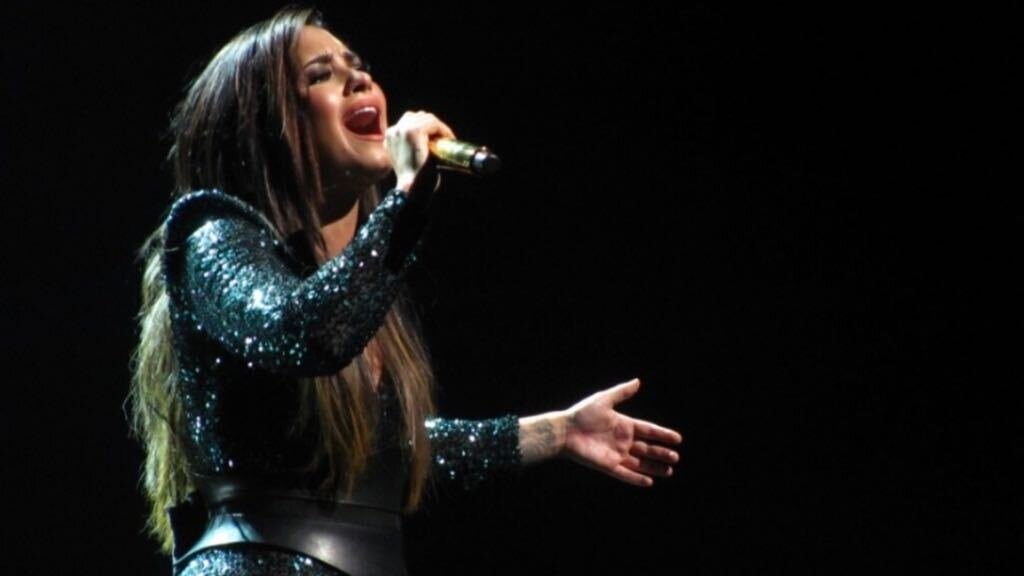Dancing With the Devil: A Testimony of Self-Growth
@marcushenderson
Demi Lovato sits down in a chair looking meticulously put together. Her shirt is buttoned up, her lipstick is carefully applied, and her hair falls loosely around her face. She looks down, fiddles with her hands. Although she looks like herself, it is clear that, underneath her skin, an uncomfortable yet necessary transformation has taken place.
In “Dancing with the Devil,” her new docuseries that was first released on YouTube in late March, with weekly episodes released until early April, Lovato opens up about her past and offers viewers a raw look into her traumatic experiences with eating disorders, depression, addiction, sexual assault, and coping with her father’s death.
The new documentary is a clapback, a rebirth, a triumph of her life after her 2018 “Tell Me You Love Me” tour documentary was postponed due to her heroin overdose. In the 2018 documentary, Lovato appears happy to the world—belting notes on stage surrounded by thousands of fans and celebrating her sobriety with friends. Yet, behind the scenes, Lovato’s friends recall her being more unhappy than ever before. “Turn the cameras off,” she says in one clip, looking stern and distraught.
Lovato’s past has never been simple. She was catapulted into the industry at a young age, beginning with pageants and working her way onto the big screen. As a former Disney child star, Lovato felt the pressure of perfection during her most formative years, where, in turn, she developed disordered eating. She recalls those around her policing what food she was surrounded by, how her birthday cakes were watermelons covered in icing.
She was also one of few Disney stars who, at the time, publicly stated that they were saving sex until marriage. When Lovato was 15, the same year she auditioned for “Sonny with a Chance” and “Camp Rock,” her virginity was stolen from her. Not wanting to go public with the information due to the purity promise she made to the public, she internalized her feelings and coped in other ways, through bulimia and self-harm. “What, I’m supposed to come out to the public after saying, ‘I have a promise ring’? Six months later, I’m supposed to say, ‘Well, actually I had sex, even though it was rape.’ Some people aren’t going to see it that way,” she says. “At least, the Christian Southern girl inside of me didn’t see it that way because sex was not normalized as a child or in the South.”
Her story upholds a tried and true quote we know all too well: healing is not linear. She began using drugs at a young age, although she warns viewers that hard drugs are not to be used recreationally. As she experimented with different drug cocktails, her preferred method being one upper and one downer, she also began heavily drinking. On stage, celebrating six years of sobriety, she tells fans “I remember drinking vodka out of a Sprite bottle at 9 a.m.,” and knew she had to become clean.
@oxge1907
After staying sober for six years, Lovato overdosed in her home on July 24th, 2018.
Her friends are somber, uncomfortable even, as they recount the night that changed the trajectory of each of their lives. “She turned blue,” her assistant, who found her in her bedroom, says in the documentary.
After her overdose, Lovato knew that the high she craved while battling the disease of addiction would quite literally kill her, which was the most sickening thought of all. Although she relapsed a few times after the overdose, she knew she needed to become clean in order to save herself. In order to get sober, she says, no one can push you. You have to want it for yourself.
Her voice shakes in her 2020 Grammy performance of her song “Anyone,” her first live performance since the overdose, where she belts “Anyone, please send me anyone/Lord is there anyone?” Tears fall down her face as she closes the song, the performance a vehement resurrection.
Lovato, the mental health voice of our generation, gained popularity not only for her smooth vocals and skillful songwriting, her charismatic personality and infectious boisterous laugh. Her honesty and bravery propelled her forward to become a role model for young folks across the world. And although we see Lovato as someone who is continuously valorous, we must also allow her the space to simply be human, too.
At the end of the series, Lovato chops her hair. She buzzes it short in the back, leaving it longer on the top. She looks in the mirror and truly sees herself this time. She announces she is sexually fluid, she breaks free of the gender and sexuality norms placed on her by her Southern roots at a young age. She meditates, smokes weed and drinks in moderation. She buys a new home, decorates it glamorously, sits on the couch and laughs with her friends.
Her hair, now short, a metaphor for the internal transformation Lovato has undergone. A testimony of self-discovery, self-reflection, self-growth.
@therealdemilovato
By Arianna Kyriacou
Journalism major at Ryerson University in Toronto, Canada, minoring in political science. Probably drinking a vanilla cold brew with my nose stuck in a book.



